Michèle lives on the first floor of an apartment building situated close to a hostel for asylum seekers, a social centre and a gendarmerie station. A vigorous knocking on her front door was needed to be heard above the clamour of the television behind it. “Mediapart?” asked Michèle (not her real name), during introductions, “I don’t like them, those ones.” She doesn’t read Mediapart, but has heard bad things said about it. She nevertheless let us in.
On the television is the face of Pascal Praud, the star presenter of the CNews channel, part of the Bolloré media empire that offers a mouthpiece for the far-right. In the studio with Praud were commentators talking about how drug trafficking is “glorified on the internet”. Michèle, neatly dressed with a matching green dress and necklace, sitting behind the dining table in the middle of her living room, from where she can see both her computer screen on which she plays Scrabble and that of the television, asked: “Did you see that scene with youngsters who fired a Kalashnikov in the street and filmed themselves?” She gets her daily fill of information about the outside world from watching CNews.
Michèle is 83 and said that she first went to vote just several years ago, encouraged by her neighbour. “When she found out that I had never voted, she looked at me with wide eyes,” recalled Michèle, pulling a mimicking face with her eyes almost popping out of their sockets. She explained that she had spent her life in a non-political home environment, neither her father nor her husband voted in elections, and that politics were not invited into the home, which used to be in Paris.
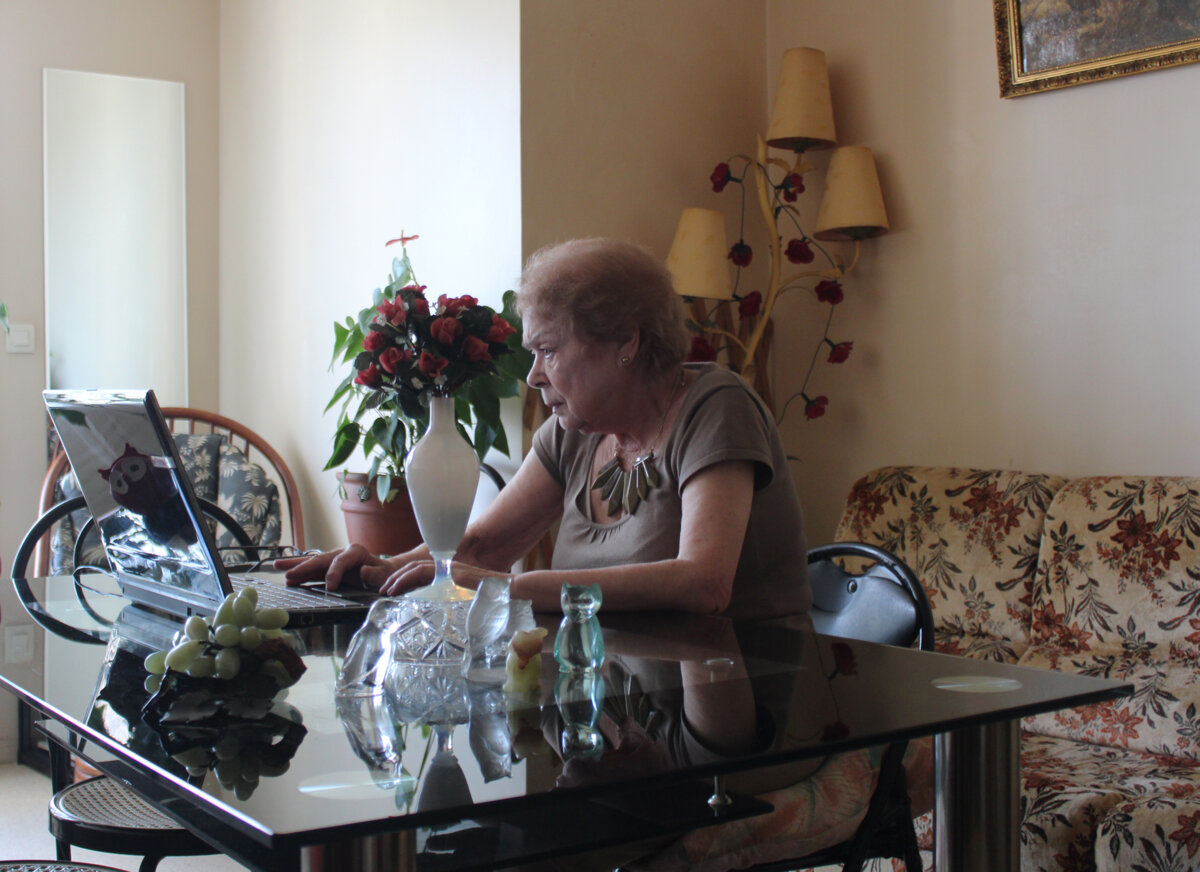
Enlargement : Illustration 1

In 2017, she voted in the presidential elections for Emmanuel Macron. She said she found him “young and cute” and that “he doesn’t seem a fool”, but that she finally became disappointed in him, to the point today where she says “I’m not even disappointed anymore, I’m sorry for him because he no longer serves any purpose”. She watched Macron’s last televised address to the nation, when “he talked only to say nothing”, and she switched off before the end.
In the 2022 presidential elections, 51% of votes cast in Gaillon went to far-right candidate Marine Le Pen (49% were for Macron). In the 2017 presidential poll, Macron had garnered 58%, with Le Pen at 42%.
As for other political leaders, Michèle says Marine Le Pen would never be able to put her far-right programme into action, and she is not impressed by the rest, bar one. For she believes that there is one who “seems to want to put into practice what he says,” a man who she doesn’t immediately name, but who “senses that there’s a fire on and wants to try and put it out”.
Michèle has seen the “fire” in Gaillon, notably in the early summer of 2023, when riots erupted around France after a police officer shot dead a 17-year-old French-Algerian boy, Nahel Merzouk, during a traffic stop in a Paris suburb. In Gaillon, cars from a Renault showroom were set ablaze along with the McDonald’s fast-food outlet in the Verte-Bonne quarter. She recalled how rioters set off firework “mortars” – explosive fireworks fired through makeshift cylinders – that landed on the terrace of her apartment, situated on the first floor of the building, close to the gendarmerie station.
She says that it has been a long time now that she doesn’t leave her home at night, “given what I hear about on the telly, and what I’m told”. She learnt that a fix room – a supervised drug injection facility – had opened in the Sentier neighbourhood in Paris where she once lived, before moving to Gaillon in 2010. She says she is still stupefied by the idea. Her fears have led her to refuse to visit her daughter who lives in a Paris suburb that she considers dangerous.
When Michèle looks out of the window when she gets up for a pee through the night, she says she can see youngsters – “kids as small as that” – in the street. “Where are they going at that hour? Nowhere, they hang out. There’s nothing in Gaillon during the day, so at night…” For her, being a single mother is no excuse for not keeping children in check. “They are lazy women who don’t look after their kids, that’s all,” and she is “fed up” with the apologies made “for all these people”.
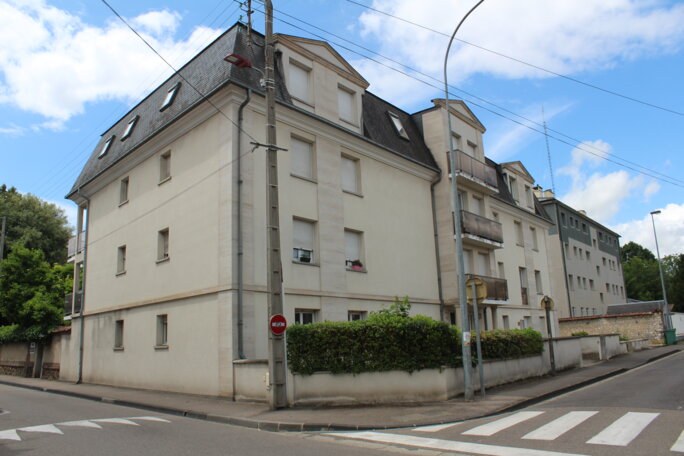
Enlargement : Illustration 2

Her neighbour across the hallway is Alexandre, 26, the only young adult to live alone in a building otherwise occupied by families and retired folk. Alexandre is deputy manager of a supermarket food counter and leaves for work every day at 4.30am, beginning his shift at 5am. He has worked since the age of 14, first as an apprentice, and then in employment on a permanent contract.
When Mediapart interviewed Alexandre, the sound of loud voices could be heard through the open window of his apartment. “That’s the hostel,” he said, referring to the nearby shelter for asylum seekers. “The pakpaks [Editor’s note: a racist French slang phrase used to describe Pakistanis and others from South Asia] often pass by on this road to get to the town centre. They shout in their language at 11pm or midnight.”
The hostel was already there when in 2018 Alexandre bought his apartment, which he renovated with the help of his father. “There is one [asylum seeker] who wears a different pair of shoes every day,” he said. “I work all day long, and they may well earn the same as me, whereas they do nothing.” But what he really he dislikes even more is the rioting and those setting bins on fire.
If Alexandre was to vote in national elections now, the issues he regards as key in choosing his candidate are law and order (fighting delinquency, reinforcing the means of the police) and purchasing power. He hates those who play “motocross in the town”. Comparing the situation in France with that in the US, he said “over there, if they carry out urban rodeos they are arrested”, referring to high-speed motorbike and car races. He complained that the town is ill-maintained and that he has to walk his dog “in the dark” at night because streetlamps are switched off by energy-saving measures. He cautiously looks behind him “several times” when out walking, especially if he is not accompanied by his dog.
The young man said he has seen a clear fall in his purchasing power. He currently earns a monthly 1,600 euros, but is unable to put any money aside, whereas when, ten years ago, he was earning the minimum legal wage of 1,211 euros he put aside 200 euros per month. In the same time gap, he claimed his monthly groceries bill has increased from 90 euros to around 350 euros, and that excludes the costs of food for his dog. His electricity bill has shot up from 20 euros per month to 75 euros per month.
That drives his anger against those who he says “profit” from unemployment benefits and the RSA welfare payment given to those who declare particularly low or no income (payments start at around 650 euros for a single person with no children), and those who he says have their bills paid by the state. His claims lack credible detail, but he believes “the country must be reorganised”.
“Go and work!” he exclaims, before citing the example of an aunt whose employer became bankrupt since when she lives in social housing. She never worked again, Alexandre said, “whereas you get pissed off getting up in the morning, being shattered, with your five weeks of holiday a year”.
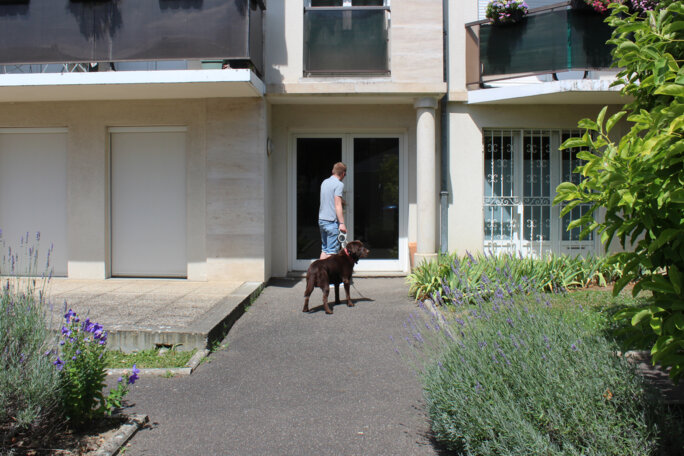
Enlargement : Illustration 3

Fortunately, his apartment, which he bought for 50,000 euros is now worth 70,000 euros, perhaps even 80,000 euros if he gets round to creating a proper bedroom.
Meanwhile, his neighbour Michèle pays a monthly rent of 700 euros for her two-roomed apartment of 45 square metres. That is a saving on the apartment she had in Paris where, she says, “the rents have tripled” in her old neighbourhood. In any case, her old home had become too big after her children had left.
In her building in Gaillon, neighbours bump into each other but hardly know each other. A woman who opened the door of her apartment on the third and last floor, closed it just as soon as we introduced ourselves. “I don’t talk to Mediapart,” she said.
Her neighbour, Benoît, said he was not surprised, explaining that some of the building’s inhabitants have become more radical politically, and socialise less. The tall and slim engineer says he too is preoccupied by the current situation in France, but his fears are not the same as those expressed by Michèle and Alexandre. His concerns are road safety, and also the environment, about which he criticises politicians for their hollow speeches. He says he tries to make his two teenage daughters aware of the issue of ecology. “They used to buy on Shein, but they’ve stopped,” he added, referring to the Chinese online fashion outlet.
Benoît has no television, and has no good word to say about the rolling TV news channels. “How do the Bolloré channels have the right to broadcast still?” he asks. “They drive the sentiment of insecurity.” He cannot understand how some people can believe what CNews puts about (as in the case of Michèle). He used to listen every morning to France Inter public radio and its highbrow sibling France Culture, but now seeks less information, no doubt because of the overall glum atmosphere that has darkened recent years.
He says he feels “paralysed” by the idea of the far-right reaching ultimate power. “I don’t see who else could win.” How about the hardline interior minister and conservative Les Républicains party leader Bruno Retailleau? “Is that different to the far-right?” he asked. Benoît says Donald Trump has shown “what is possible […] Democracy can fall quite quickly”. He believes that the US president’s policies have become, with time, to seem ordinary, and says he sees how true that is where he works, where some of his colleagues are full of praise for the billionaire, (and, he added, others drive Tesla cars).
While we’re at it, we’ll give work to those who are more French than the others.
As different as their opinions may be, Michèle, Alexandre and Benoît see eye-to-eye on one point. Namely, none of them likes radical-left leader Jean-Luc Mélenchon. One described him as “dangerous”, another “populist”. “He says that there are too many blue-eyed people with blond hair in France,” commented Michèle, who says she has seen Gaillon change in the 15 years she has lived there. The word “Arab” pops up regularly in the discussion. “We have Arabs here,” says Michèle – kebab houses, a butcher’s, a restaurant, and a dressmaker.
Because the halal butcher’s shop is closer to her home than the Intermarché hypermarket, one of the major French retail chains, Michèle buys her meat there. “I asked, all the same, where it comes from.” She has also visited the two kebab houses, but was disappointed to find that one of them doesn’t serve alcohol and “won’t go back there” […] while we’re at it, we’ll give work to those who are more French than the others”. Michèle hides neither her Islamophobia nor her xenophobia: “I went out the other day and there were nothing but foreigners.”
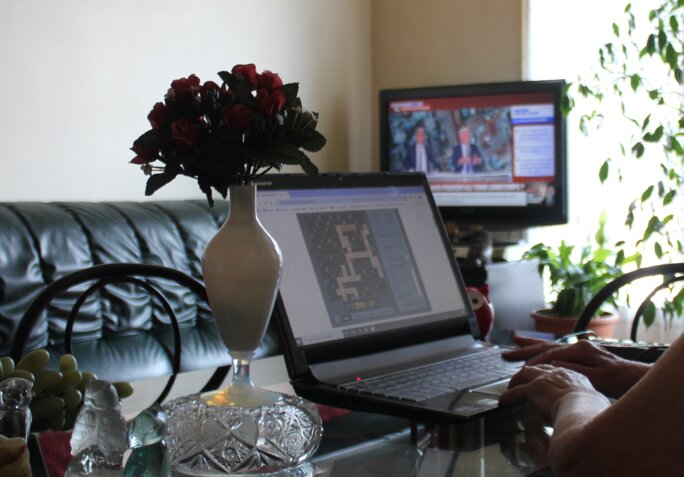
Enlargement : Illustration 4

Benoît moved to Gaillon in 2008, and has lived in the building since 2018. He also says that when crossing the centre of town he sees practically only foreigners or people of foreign origins. “All those of ‘French origin’ stay indoors,” he says, “they socialise less, occupy less of the public space.” He admits being one of them. “It’s perhaps also that which gives the impression of the 'Great Replacement' to those who want to believe in it, on top of the television [reports],” he suggests.
Odile Hantz is the mayor of Gaillon, elected in 2020 as an independent candidate, succeeding mayors of Left and Right. She knows that she will face at least one far-right list of candidates when she stands for re-election in municipal council elections due in March next year. There are four Members of Parliament (MPs) from the far-right Rassemblement National party in the local département (county), l’Eure, and Gaillon is situated in the last parliamentary constituency within the département still held by the Left (socialist MP Philippe Brun).
“We always keep the risk of the far-right in mind, but that would not represent Gaillon,” commented Hantz’s deputy in charge of social cohesion and solidarity, Chiraz Moalic. Hantz and Moalic say the population of Gaillon is essentially working-class with a long history of racial mixing, and in the past offered shelter to Spanish, Chilian and Kosovar refugees.
On the subjects of insecurity and immigration, the key policy issues for the far-right, “people have an interpretation, especially when one spends the day in front of [rolling news channels] BFMTV or CNews,” said Moalic, adding that in Gaillon, “insecurity is an impression, not a reality”. Hantz, agreeing, insisted that the hostel for asylum seekers caused no concern.
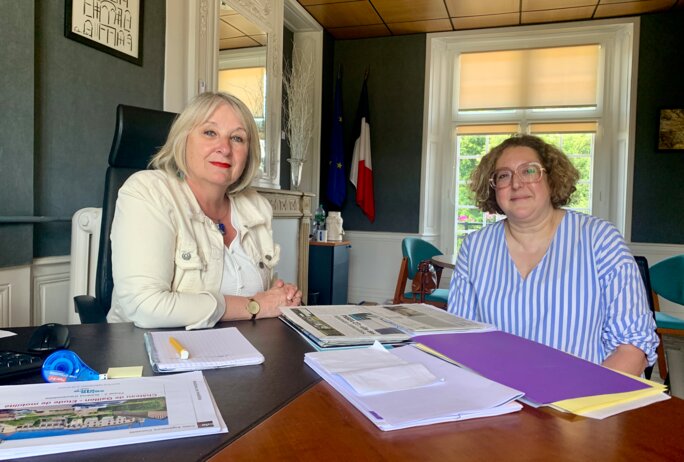
Enlargement : Illustration 5

Jade, one of Benoît’s two daughters, recounted how some pupils in her school year shared videos made by the far-right Rassemblement National party chairman, Jordan Bardella. She enjoys discussing politics with one of her friends, and will vote for the first time in presidential elections due in 2027. While her political interests centre on the upholding of rights (those of women in particular) and the acceptance of people’s diversity, she says she feels pessimistic about the future. Asked if she felt threatened by insecurity, she said: “Regarding immigration, no, but regarding men in general, yes.” She argues that perpetrators of crimes against women are “demonized” when they are Arab, “whereas most of them [perpetrators] are white”.
Benoît’s wife Gabrielle (Jade’s mother-in-law), a teacher at the secondary school in Gaillon, predicts that an election victory for the Rassemblement National would inevitably reveal “a fracture” in society. “Some say that it could be salutary, but I find it dangerous to wait until people are in power before realising that they are noxious,” she said, adding that the problem is not limited to France but also affects other countries in Europe and beyond which are “veering strongly to the Right”. For Gabrielle, “we’re seeing a change of epochs”.
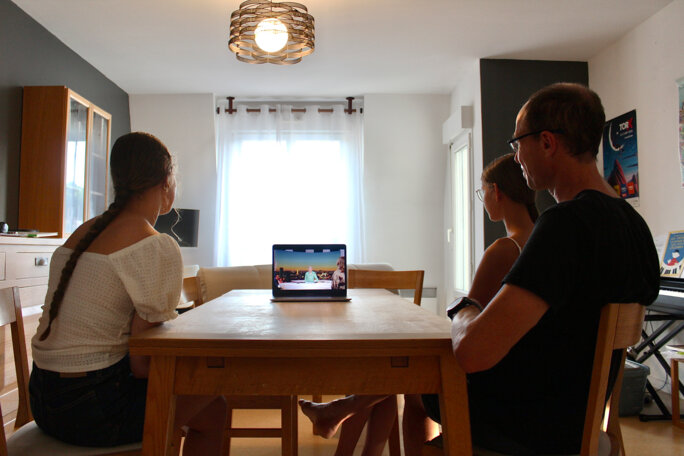
Enlargement : Illustration 6

Groups from the asylum seekers hostel pass by the building often. When Mediapart was present, a man wearing the Afghan dress of tunic and trousers, the shalwar kameez, passed under Alexandre’s open window, talking into his mobile phone amid shrieks of laughter. Alexandre finally admitted that “I am far-right”, quickly adding: “But I am not racist – racist is a powerful word.” He spoke of his former sports coach, who came from Senegal but who felt French and who had always worked. “That doesn’t bother me. But those who arrive and don’t do anything, or the women who have eight children...” he said, launching into the thematic of “good” and “bad” foreigners.
He conceded however that the notion of “one hundred percent French doesn’t exist”, and confided: “It appears that there’s Spanish blood on my grandmother’s side, so.”
Alexandre says that those who describe Rassemblement National chairman Jordan Bardella as racist do not understand anything. Jean-Marie Le Pen, father of Marine Le Pen, was “the extreme of the extreme” he said, while Bardella is “softer, more cool”. The proof of that, he argued, is that Bardella “says that it’s a section [only] of foreigners who cause shit”.
He considers that France is going so far downhill that it almost requires a third world war to put the country to rights. He would like to see more of France’s tricolour flags flying in public because “we’re not proud enough of our country”.
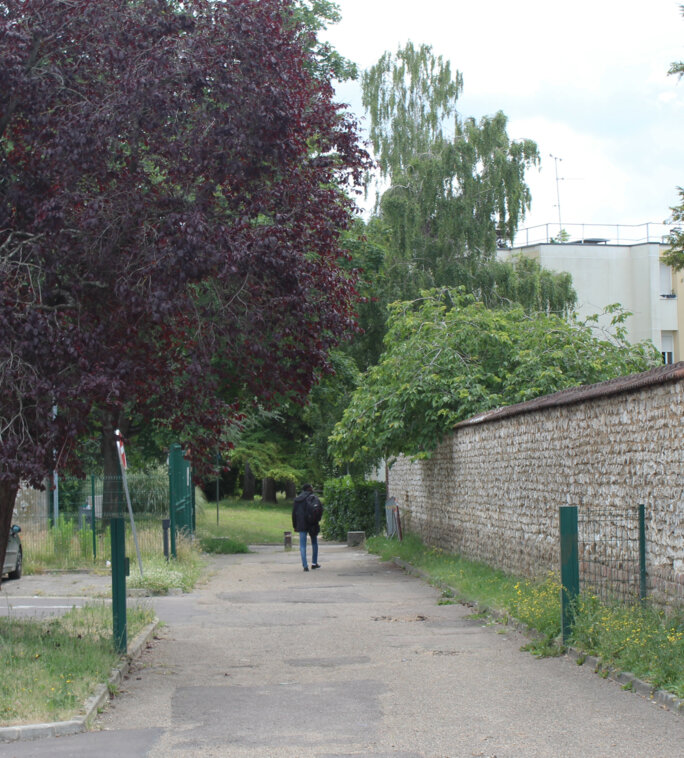
Enlargement : Illustration 7

During our last meeting with his neighbour Michèle, when she was photographed for this report, she had swapped news channels from CNews to BFMTV. “I watch several channels,” she explained, “I try to form an opinion.” She had then just recently watched the news about the annual, nationwide, summer solstice evening street music parties, La Fête de la Musique, which had left six people victims of stabbings and was marked by complaints from numerous women that they had been jabbed by strangers in the crowds using syringe needles. “In my time there wasn’t all that,” she commented.
The news on the television was laden with violence, from the civilian deaths, notably of children, in Gaza and Ukraine, to the US attacks against Iran, prompting Michèle to wonder how anyone can still believe in god. “They’re mad these men, they want power. ”
Nowadays, said Michèle, “I believe I am rightwing”. The politician she finds the most interesting, who she referred to in our first interview and later identified, has just been elected as head of the conservative Les Républicains party. His name is Bruno Retailleau, and CNews adores him.
- The original French version of this report can be found here.
English version by Graham Tearse


